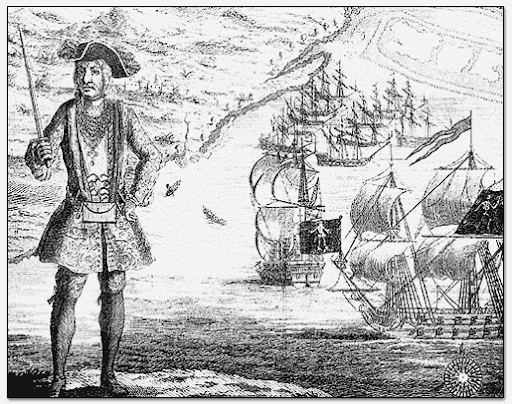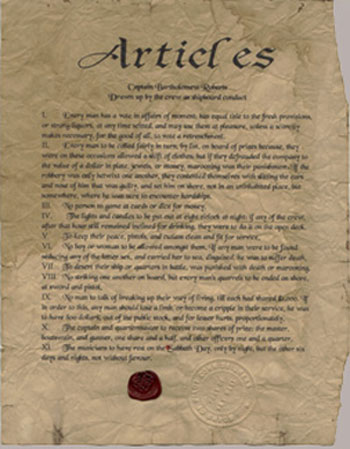
One of the most successful and meaningful metaphors I’ve found when working on innovation projects in ICMM Level 1 or Level 2 organisations recasts the innovator as pirate. Pirates rebelled against authority; innovators need to rebel against the authority of Operational Excellence. Pirates hide away in Pirate’s Cove; innovators need their own equivalent. Pirates talk funny, have a wooden leg and a parrot sitting on their shoulder. Etc.
Pirate clichés aside, what’s less well known about the seafaring pirates of the 18th Century is the extraordinary level of trust and teamwork they engendered amongst their ranks. In no small part this came about because many pirates arrived at their career after being illegally dragged into the Royal Navy and then thrown out again without any support after the wars they were expected to fight had ended. In other words, they had something to rebel against, and that something was The Establishment. I guess this is stretching the metaphor a little bit since very few employees recruited onto Operational Excellence were literally press-ganged, but the point ends in pretty much the same place: Operational Excellence is all about efficiency, which in turn means that employees are often seen as resources to be exploited. Anyway, let’s not go too far down that rabbit-hole, the main point is to understand how 18th Century piracy achieved and maintained the levels of trust and teamwork required to defeat much more plentifully resourced opponents. The answer was the Pirate Code. Effectively a set of heuristics that every pirate was expected to sign up to. Like any good manifesto, the Pirate Code evolved over the years, with successive pirate Captains building on the principles of their predecessors. The Code probably reached something like its pinnacle in the Bartholomew Roberts version. If there is a competition between all pirates in plundering ships, Bartholomew Roberts, or ‘Black Bart’ as he is more popularly remembered, would win it by far. Perhaps he was the most successful pirate that the world ever knew. Rumour has it that he successfully plundered close to 400 ships.
In addition to his Code, the other big reason for the success of the Black Bart crew was his boldness. This fearless leader terrorised every ship he encountered throughout the Caribbean Sea. Including many superior warships, ones that most pirates would avoid at any cost. The conventional pirate logic was very much consistent with the strategy that later came to make Napoleon such a successful General: Critical mass at the critical point. Or, only fight battles you know you can win. Black Bart knew that there was a chutzpah-related multiplication factor that could be applied to the equation: Critical mass of highly integrated, self-organising, fully-focused pirates at the critical point. That’s probably another story for another day. The main point of this story is to look at Black Bart’s Pirate Code and make a first attempt at re-framing it into the context of the 21st Century innovation pirate inside a larger organisation that likely as not sees them as a virus, cockroach or efficiency-sapping parasite. Other derogatory labels are available.

Here it is, with my first hack at making a 300-year upgrade:
I. Every man has a vote in affairs of moment; has equal title to the fresh provisions, or strong liquors, at any time seized, and may use them at pleasure, unless a scarcity makes necessary, for the good of all, to vote a retrenchment. (Every innovator gets a fair say in what happens; every innovator shares equally in the spoils; every innovator has equal skin and equal soul in the game – ‘no prey no pay’.)
II. Every man to be called fairly in turn, by list, on board of prizes because, they were on these occasions allowed a shift of clothes: but if they defrauded the company to the value of a dollar in plate, jewels, or money, marooning was their punishment. If the robbery was only betwixt one another, they contented themselves with slitting the ears and nose of him that was guilty, and set him on shore, not in an uninhabited place, but somewhere, where he was sure to encounter hardships. (Any innovator betraying the trust of other team members, irrespective of how trivial their betrayal, is out of the team.)
III. No person to game at cards or dice for money. (Innovators don’t gamble. Any and all experiments must be ‘safe-to-fail’.)
IV. The lights and candles to be put out at eight o’clock at night: if any of the crew, after that hour still remained inclined for drinking, they were to do it on the open deck. (Tempting as it might be to put in all-nighters, there needs to be clear end-point to the working day. The problem with all-nighters and working excessively long hours is that if an opportunity or threat arrives suddenly, every member of the team needs to be at their peak, and ready to deal with it. Outside the agreed working hours, it is definitely okay to re-charge the batteries on ‘open deck’ with other members of the team… the team that plays together, stays together.)
V. To keep their peace, pistols, and cutlass clean and fit for service. (Keep all your resources clean and fit for service at all times… you never know when things might kick off.)
VI. No boy or woman to be allowed amongst them. If any man were to be found seducing any of the latter sex, and carried her to sea, disguised, he was to suffer death. (No Operational Excellence thinking or thinkers allowed within the team.)
VII. To desert their ship or quarters in battle, was punished with death or marooning. (Innovators have the back of other innovators at all times; when the pressure is really on, innovators do whatever is required to support other members of the team.)
VIII. No striking one another on board, but every man’s quarrels to be ended on shore, at sword and pistol. (Shit happens. Innovators check their egos when they join the project, and sort out personal quarrels only after it ends.)
IX. No man to talk of breaking up their way of living, till each had shared £1,000. If in order to this, any man should lose a limb, or become a cripple in their service, he was to have 800 dollars, out of the public stock, and for lesser hurts, proportionately. (Innovating is hard and comes with a strong likelihood of harsh psychological penalties; innovators will be compensated for such harms… Bearing in mind that ‘what doesn’t kill you makes you stronger’.)
X. The captain and quartermaster to receive two shares of prize: the master, boatswain, and gunner, one share and a half, and other officers one and a quarter. (The team decides how to divide up the rewards. There is no such thing as the ridiculous orders of magnitude difference in reward between the Captain and the crew as is usually found in hierarchical Operational Excellence management.)
XI. The musicians to have rest on the Sabbath Day, only by night, but the other six days and nights, not without special favour. (The innovator emotional support network needs, deserves and will have time off.)
XII (Add optional article(s) here) (e.g. Operational Excellence is not the enemy. What the innovation team does today benefits them tomorrow, and their tomorrow, in turn, pays for ours.)
That’s it. Pirate First Principles.
It’s almost like Black Bart understood complex systems.
